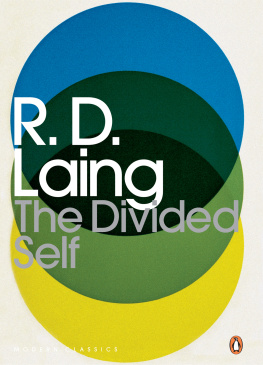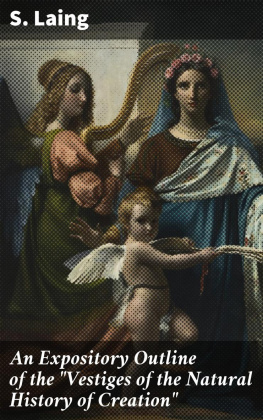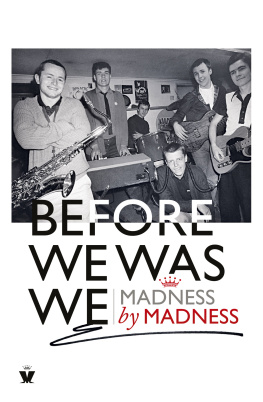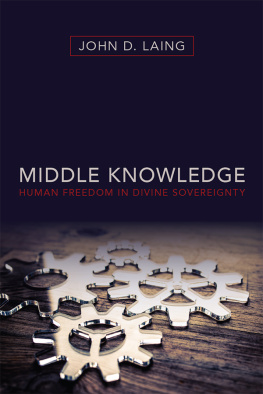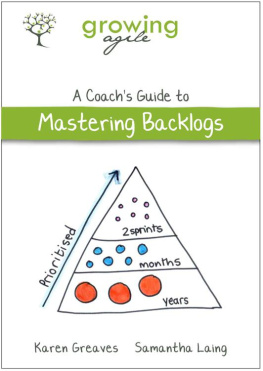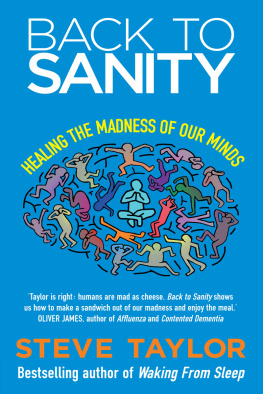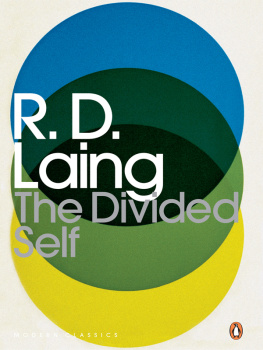R. D. Laing - The Divided Self: An Existential Study in Sanity and Madness
Here you can read online R. D. Laing - The Divided Self: An Existential Study in Sanity and Madness full text of the book (entire story) in english for free. Download pdf and epub, get meaning, cover and reviews about this ebook. year: 2010, publisher: Penguin Books, genre: Religion. Description of the work, (preface) as well as reviews are available. Best literature library LitArk.com created for fans of good reading and offers a wide selection of genres:
Romance novel
Science fiction
Adventure
Detective
Science
History
Home and family
Prose
Art
Politics
Computer
Non-fiction
Religion
Business
Children
Humor
Choose a favorite category and find really read worthwhile books. Enjoy immersion in the world of imagination, feel the emotions of the characters or learn something new for yourself, make an fascinating discovery.
- Book:The Divided Self: An Existential Study in Sanity and Madness
- Author:
- Publisher:Penguin Books
- Genre:
- Year:2010
- Rating:3 / 5
- Favourites:Add to favourites
- Your mark:
- 60
- 1
- 2
- 3
- 4
- 5
The Divided Self: An Existential Study in Sanity and Madness: summary, description and annotation
We offer to read an annotation, description, summary or preface (depends on what the author of the book "The Divided Self: An Existential Study in Sanity and Madness" wrote himself). If you haven't found the necessary information about the book — write in the comments, we will try to find it.
R. D. Laing: author's other books
Who wrote The Divided Self: An Existential Study in Sanity and Madness? Find out the surname, the name of the author of the book and a list of all author's works by series.
The Divided Self: An Existential Study in Sanity and Madness — read online for free the complete book (whole text) full work
Below is the text of the book, divided by pages. System saving the place of the last page read, allows you to conveniently read the book "The Divided Self: An Existential Study in Sanity and Madness" online for free, without having to search again every time where you left off. Put a bookmark, and you can go to the page where you finished reading at any time.
Font size:
Interval:
Bookmark:
An Existential Study in Sanity and Madness
With an Introduction by Anthony David

PENGUIN BOOKS
PENGUIN CLASSICS
Published by the Penguin Group
Penguin Books Ltd, 80 Strand, London WC2R 0RL , England
Penguin Group (USA) Inc., 375 Hudson Street, New York, New York 10014, USA
Penguin Group (Canada), 90 Eglinton Avenue East, Suite 700, Toronto, Ontario, Canada M4P 2Y3
(a division of Pearson Penguin Canada Inc.)
Penguin Ireland, 25 St Stephens Green, Dublin 2, Ireland (a division of Penguin Books Ltd)
Penguin Group (Australia), 250 Camberwell Road, Camberwell, Victoria 3124, Australia
(a division of Pearson Australia Group Pty Ltd)
Penguin Books India Pvt Ltd, 11 Community Centre, Panchsheel Park, New Delhi 110 017, India
Penguin Group (NZ), 67 Apollo Drive, Rosedale, North Shore 0632, New Zealand
(a division of Pearson New Zealand Ltd)
Penguin Books (South Africa) (Pty) Ltd, 24 Sturdee Avenue, Rosebank, Johannesburg 2196, South Africa
Penguin Books Ltd, Registered Offices: 80 Strand, London WC2R 0RL , England
www.penguin.com
First published by Tavistock Publications Ltd 1960
Published in Penguin Classics 2010
Copyright Tavistock Publications Ltd, 1960
Preface copyright R. D. Laing, 1965
Copyright R. D. Laing, 1969
Introduction copyright Anthony David, 2010
All rights reserved
The moral right of the author and the introducer has been asserted
Except in the United States of America, this book is sold subject
to the condition that it shall not, by way of trade or otherwise, be lent,
re-sold, hired out, or otherwise circulated without the publishers
prior consent in any form of binding or cover other than that in
which it is published and without a similar condition including this
condition being imposed on the subsequent purchaser
ISBN: 978-0-14-196208-5
PENGUIN MODERN CLASSICS
The Divided Self
R.D. Laing, one of the best-known psychiatrists of modern times, was born in Glasgow in 1927. His writings range from books on social theory to verse, as well as numerous articles and reviews in scientific journals and the popular press. His many publications include The Divided Self, Self and Others, Interpersonal Perception, The Politics of Experience, The Bird of Paradise and Madness and Folly. R. D. Laing died in 1989.
Anthony David graduated in medicine from Glasgow University in 1980. After training in neurology he switched to psychiatry at the Maudsley & Bethlem Hospitals. He is currently Professor of Cognitive Neuropsychiatry at the Institute of Psychiatry, Kings College, London. He has edited several books including The Self in Neuroscience and Psychiatry (2003) with T. Kircher, and Insight and Psychosis (2nd ed., 2004) with X. Amador, and is author of over 350 publications in peer-reviewed medical and scientific journals.
The Divided Self (DS) by Ronald David Laing was first published in 1959/1960, subtitled An Existential Study in Sanity and Madness. It is divided into three parts: the first establishes the theoretical basis for the book with a technical description of what Laing called the existential-phenomenological foundations for a science of persons, followed by an application of this foundation to psychosis. Part Two contains further theoretical development on the idea of the self and false self system with illustrations from literature (e.g., Kafka, Kierkegaard) as well as clinical cases, while Part Three sees the application of these ideas to Laings own more detailed case descriptions and published case histories. If anyone had said at the time that they thought the foregoing had the makings of a best-seller, a must-read text for any would-be counterculture guru, an inspirational work for future sociologists, psychologists and dramatists well, you would have said they were mad.
This is of course not the whole story. DS was the first of several books and the beginning of an intellectual and personal trajectory for the author. Subsequent work was more controversial. In Sanity, Madness and the Family (1964), R.D. Laing took a more openly defiant stance against the psychiatric establishment, and in The Politics of Experience and The Bird of Paradise (1967), he extended his critical thinking to wider aspects of health and society, to personal discovery and spirituality; this was after all the swinging sixties. He covered a wider territory both intellectually and physically, engaging with prophets real and false being fted and at times reviled. None of this, it turned out, was compatible with the continued sober (in both senses) reflection on psychiatric research and the comfortable certainties of regular working and family life.
When we return to DS after half a century, we do so through the lens of subsequent work and events. We have some distinct advantages, including a thorough biography by his son Adrian (R. D. Laing: A Life, 2006), and some autobiographical sketches, including those published as Wisdom, Madness and Folly (1985). I particularly value a thoughtful reconsideration at, as it turns out, roughly the halfway point between publication and this special edition, by Andrew Smith in the British Journal of Psychiatry in 1982. We may be aided (distracted?) by the reams of comments and analyses by scholars, journalists and creative writers, as well as published interviews, a corpus of work far exceeding the mans own not inconsiderable output. We also have, as additional material, reactions to his untimely death in 1989 at the age of sixty-one. Not that any of these sources can be described as objective a word to which Laing had an almost Pavlovian-rage response and to which he returned again and again in his writings. Laing located many of the problems of humanity as being a consequence of one person they could be a mother or father, a therapist, a psychiatrist, a politician, etc., viewing another as an object rather than a human being.
One of the most famous sections of DS occurs early on when he quotes verbatim from Lectures on Clinical Psychiatry (1905) by Emil Kraepelin, whose description of dementia praecox became the template for the modern-day diagnosis of schizophrenia. The signs and symptoms of disease are coolly elicited by Professor Kraepelin. The young patients utterances, dismissed as not containing a single piece of useful information, are then forensically recast by Laing as nothing less than the desperate and vivid attempts of a tormented individual to be heard (pp.29-31). In the subsequent paragraphs he writes that it is simply impossible to be objective in the manner deemed desirable of a psychiatrist, without deforming the supposed object of contemplation into a dehumanized thing, a process which, if not the cause of the problem (psychosis or other forms of alienation) in the first place, at least perpetuates it.
Despite the sense of such admonishments raining down from the hereafter, I think it is possible to be objective, but in a good way, when reconsidering DS; that is to say avoiding obvious prejudices positive or negative and taking a stance that sees the work and its author in a historical context. In doing so I cannot help but reveal that, as a practising psychiatrist, working in the bastion of British psychiatry, the Maudsley-Institute of Psychiatry, in London, I remain true to my training and my profession. I am no Laingian.
Book reviews at the time provide a contemporaneous judgement unbiased by later opinion. These show that, within the psychoanalytic establishment (which was housing Laing at the time), there was a touch of damning with faint praise, an impression that this book was a restatement in existentialist terms of truths already well known and accepted. Certainly the idea of a false self had been articulated by D. W. Winnicott, one of Laings supervisors at the Tavistock Clinic where the writing of
Font size:
Interval:
Bookmark:
Similar books «The Divided Self: An Existential Study in Sanity and Madness»
Look at similar books to The Divided Self: An Existential Study in Sanity and Madness. We have selected literature similar in name and meaning in the hope of providing readers with more options to find new, interesting, not yet read works.
Discussion, reviews of the book The Divided Self: An Existential Study in Sanity and Madness and just readers' own opinions. Leave your comments, write what you think about the work, its meaning or the main characters. Specify what exactly you liked and what you didn't like, and why you think so.

